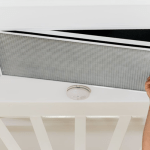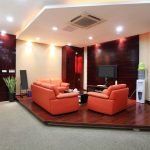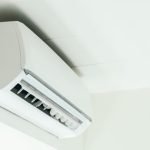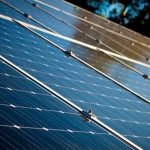
A well-maintained AC unit usually lasts anywhere from 12 to 17 years. If you follow up regularly with AC unit maintenance, your unit will last a long time, and you’ll save money in the process.
If you don’t prep your AC unit regularly, you’ll run into many future problems. No one wants to constantly call an HVAC specialist when their AC unit needs repair.
Also, no one wants to endure the harsh summer heat when their AC unit suddenly stops working. The good news is that maximizing air conditioning efficiency is a straightforward process.
In this article, we’ll explain all the ways you can maximize efficiency of your AC unit and preserve its shelf life.
Clean the Outdoor Condenser Area
The condenser is an important part of your AC unit. It’s a two-way system that takes the hot air from your home and transforms it into cool air that’s released back inside.
As you can see, the condenser needs to work properly to ensure the AC unit produces cool air at all times. You can improve the efficiency of your AC unit by cleaning it and removing any debris.
The condenser is located in the square-shaped AC unit near your home. If you’re located in a woodsy area, leaves and pinecones can get stuck inside. Simply remove the hard debris and use a leaf blower to clean the condenser.
Keep Your Indoor Vents Clean
The air vents transfer cool air evenly throughout your home. If they are dirty and blocked, the air conditioner will continue running and not push out the air you need to stay cool.
This will result in your raising lowering the temperature, and running the unit for longer than you should. Keeping your indoor vents clean is fundamental in saving money in the summer months.
Fortunately, you can use a vacuum to clean your indoor vents and maintain steady airflow from your AC unit. Also, you should keep large objects like blinds and furniture away from your indoor vents.
Adjust Your Thermostat Properly
During extreme heat, it’s common to run an AC unit for long periods of time. The problem is that your AC unit could be running when you’re not even home.
This seems like a necessary evil since you want your home to be cool when you come back. Though, you can program your thermostat to automatically adjust your home’s temperatures during different times of the day. This is ideal if you plan on being away from home for long periods of time.
Keep Heat-Producing Appliances Away from the Thermostat
Your AC unit’s thermostat has a sensor inside that gauges the indoor temperature of your home. Once that’s done, the sensor communicates to the thermostat through a relay system whether the temperature needs to increase or decrease.
Because of this, you should always keep heat-producing appliances away from the thermostat. Having these appliances near your thermostat can trick the sensor, causing it to raise your indoor temperature higher.
This causes the entire AC system to run longer and work harder than it has to.
Keep Your Blinds and Curtains Closed
Having natural light in your home can open up your living space and add a spectacle of beauty to your home. Natural light from your open curtains can even benefit your health.
Unfortunately, the more natural light enters your home, the more thermal energy does as well. This can increase your home’s indoor temperature throughout the day.
If you don’t want your AC unit to work so hard, consider keeping your blinds and curtains closed at least during periods of intense sunlight. You can also invest in UV-blocking window shades to avoid this problem.
Clear the Drain Line to Improve Air Conditioning Efficiency
AC units have to drain excess water produced from inside. This is where the drain line comes into play. It’s located by the indoor cooling coil, which is positioned about the furnace.
In many homes, you can find the furnace in the basement. If your drain line gets blocked, you’ll encounter an AC drain pan full problem. All this water can leak in your basement and cause problems with your unit.
To prevent this problem, pour one cup of bleach down the AC drain. Finally, flush the drain with a gallon of water.
Avoid Using Heating Appliances During the Hottest Parts of the Day
Now, we mentioned how the condenser works inside an AC unit. It absorbs warm air from the home and transforms it into cool air. This means the hotter your home is, the harder your AC unit will work.
So, if you’re using heating appliances when your hot already has a high temperature, your AC unit will work harder than it has to. For this reason, avoid using heating appliances, like an oven or dryer, during the hottest parts of the day.
Fix Air Duct Leaks Immediately
If you’re renovating your home and have recently added ductwork to an unconditioned space, you should make sure it’s sealed properly. That way, the ducts won’t leak any cool air.
The more leaks you have in your home, the harder your AC unit will have to work. If you see a leak, make sure to patch it up with special UL 181-rated insulation tape.
During your next scheduled HVAC maintenance session, make sure to point the problem out to the specialist for further review.
Change Your AC Filters Regularly
AC filters make sure that the air entering your home is clean and safe. These filters play a pivotal role in improving the indoor air quality of your home.
Eventually, the air filters will become dirty and clog the AC unit. If you want to keep your AC unit, make sure you’re changing these filters regularly.
If you need help learning how often to change them, check with the AC unit’s manufacturer or your HVAC service technician.
Learn More Home Improvement Tips
Improving your air conditioning efficiency will undoubtedly help you save money during the summer when home cooling costs are usually the highest.
Ultimately, following these tips can help you avoid the headaches of future AC problems. Do you want to learn more home improvement tips? If so, check out our blog for more helpful articles.






